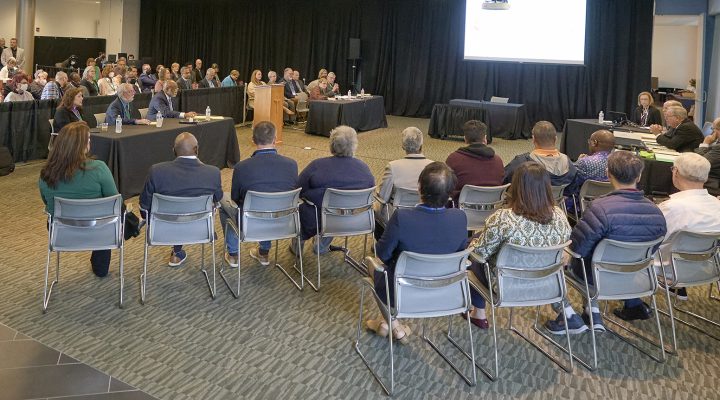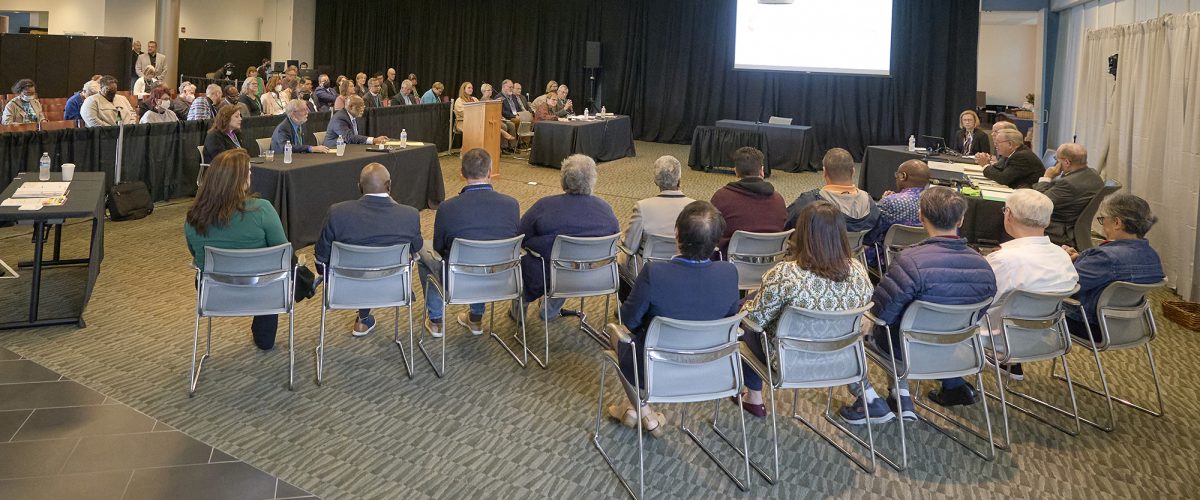A United Methodist Church court composed of 13 clergy cleared suspended Bishop Minerva G. Carcaño of four charges after a three-day trial marked by complicated allegations of misconduct and often emotionally fraught testimony from clergy and laypeople from the California-Nevada Annual Conference.
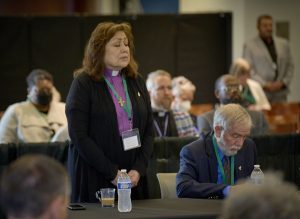
United Methodist Bishop Minerva G. Carcaño stands as the presiding bishop reads the jury verdict on September 22, 2023, the fourth day of her church trial in Glenview, Ill. (Photo by Paul Jeffrey, UM News)
Carcaño stood with her eyes closed as the presiding judge, retired bishop Alfred W. Gwinn, read the verdict after the jurors had deliberated for five-and-a-half hours the previous day. Carcaño’s demeanor mirrored the pre-verdict instructions of Gwinn, who had admonished observers not to show any visible emotions as the jurors’ decision was read.
Carcaño was brought to a church trial focused on four “chargeable offenses” under United Methodist law stemming from conflicts in her administration:
- Disobedience to the order and Discipline of The United Methodist Church.
- Relationships and behavior undermining the ministry of another pastor.
- Harassment including racial and/or sexual harassment.
- Fiscal malfeasance.
The charges — disclosed for the first time at the trial’s opening — stemmed from three complaints brought against Carcaño in March 2022 involving several episodes in the Sacramento-based conference:
- Carcaño’s part-time residence in a San Francisco parsonage belonging to Park-Presidio United Methodist Church
- Decisions around the development of former Trinity United Methodist Church across from the campus of the University of California in Berkeley
- The hiring of Carcaño’s daughter, Sophia Spaniola Carcaño, as a part-time administrative assistant for then-superintendent of the Bay District, Staci Current
- Conflict around the request of a young clergywoman, Chelsea Constant, for a 12-week maternity leave overlapping her appointment as a church planter in 2020
- Allegations that Carcaño vengefully attempted to “dig up dirt,” as one witness put it, on several conference staff who opposed her decisions.
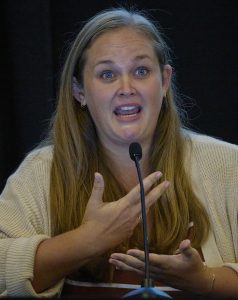
Chelsea Constant testifies on September 20, 2023, the second day of a church trial of Bishop Minerva G. Carcaño in Glenview, Ill. Constant is one of several conference members who filed a complaint against Carcaño. (Photo by Paul Jeffrey, UM News)
Church counsel Janet Forbes, a retired clergy member of the Mountain Sky Annual Conference based in Centennial, Colo., brought 12 witnesses to support the allegations against Carcaño, including several people who signed complaints against the bishop. The church’s witnesses included:
- Jorge Dominguez, council on ministries director
- Diane Knudsen, conference treasurer
- Kristin Stoneking, chair of the conference council on finance and administration
- Debra Brady, a California-Nevada district superintendent
- Bette Spencer, a member of Park-Presidio UMC
- Craig Brown, former director of congregational development who left The United Methodist Church in July 2022 and is now senior pastor of First Free Methodist Church in Seattle, Wash.
- Shinya Goto, superintendent of the Los Rios District
- Mike Harrell, the bishop’s executive assistant
- Chelsea Constant, a clergywoman now appointed to a new church in Dublin, Calif.
- Kathy LaPoint-Collup, who was Constant’s senior pastor and mentor during the conflict over her leave and appointment
- Paul Extrum-Fernandez, conference pensions executive
- Harold Caudle, chair of the conference board of trustees
The most compelling testimony came on the trial’s second day, when Goto, an Asian American clergyman, and Current, an African American clergywoman, painted vastly different portraits of Carcaño’s character and behavior as an administrator. Goto characterized the bishop’s behavior as angry and vindictive, claiming she instructed him to “dig up dirt” on colleagues who opposed her. In contrast, Current described the bishop as a passionate clergywoman of color seeking to fashion an administration of broad-based collaboration.
In addition to Carcaño, Campbell, a retired clergy member of the Boston-based New England conference, called:
- Staci Current, who was superintendent of the Bay District and who hired the bishop’s daughter as her administrative assistant, and who requested $100,000 from a district fund to renovate the Park-Presidio UM parsonage
- Mary Maaga, a member of the conference board of trustees who testified to the bishop’s actions during a meeting on the Trinity UMC redevelopment project
- Odette Lockwood-Stewart, current Park-Presidio pastor who testified that renovating its parsonage benefited the church, with the parsonage now worth about $2.1 million and occupied by a tenant whose $3,5000-a-month rent supports the church’s mission.
- Felicisimo Cao, who testified to being approached by Goto, the Los Rios District superintendent, to sign a letter alleging harassment by Carcaño
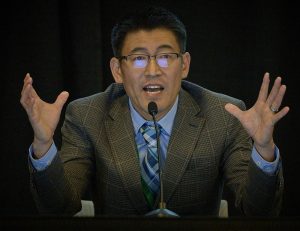
Shinya Goto testifies on September 20, 2023, the second day of a church trial of Bishop Minerva G. Carcaño in Glenview, Ill. Goto, a witness for the church, is superintendent of the Los Rios District of the California-Nevada Annual Conference of the United Methodist Church. (Photo by Paul Jeffrey, UM News)
Carcaño’s testimony on the trial’s third day marked the first time during her 19-month suspension she was allowed to tell her side of the conflicts under her administration because of the confidentiality requirements of the church’s legal process.
A veteran of 47 years of ordained ministry, the bishop described her suspension as “banishment.” During the suspension, she was prohibited from working in the California-Nevada conference and from any contact with any United Methodist church or body.
Toward the conclusion of her testimony, Carcaño said: “Friends, I am embarrassed that I was not able to manage the work of this annual conference and its staff and its relationships in a way that would have prohibited this extended process that has not only affected me but affected the California-Nevada Conference … and has brought disruption to the life of The United Methodist Church.”
In her closing argument, church counsel Forbes read for the jurors all the specifications related to the four charges and reminded them a vote to convict on any specification constituted conviction on that charge. (The bishop’s advocate, Scott Campbell, issued a statement after the trial saying Forbes’ interpretation was inaccurate).
“This moment is particularly hard for so many of us in part because power is so complex,” Forbes said. “There is power in the sharing of power toward justice. There is power in the leverage of power for the common good. There is power in the abuse of power that diminishes who uses it and who it’s used against. A leader can demonstrate prophetic leadership and do harm in other ways. Institutional power can offer necessary systems of accountability.”
In his closing statement, Campbell said the charges against Carcaño represented “a loss of perspective” in the interpersonal conflicts at the base of the complaints.

United Methodist Bishop Minerva G. Carcaño speaks to the press in Glenview, Ill., on September 22, 2023, following a unanimous not guilty verdict rendered by the jury in her trial on violating church laws. She is accompanied by her counsel in the trial: the Rev. Scott Campbell (left) and Judge Jon Gray. (Photo by Paul Jeffrey, UM News)
“It’s up to you to determine not who is at fault but whether chargeable offenses were committed,” Campbell said. “Do they justify conviction? These are not remedial measures; these are remedies of the last resort. Has the bishop’s behavior been so egregious, so incorrigible, so destructive of the church, not only to remove [her] from her ministry but to expel her from the church?”
The trial court was composed of 12 ordained elders and one ordained deacon chosen from candidates proposed by the bishops of the North Central Jurisdiction. The trial venue was moved from Pasadena, Calif., in the Western Jurisdiction to the headquarters of Wespath Benefits and Investments, the UMC’s pensions agency in Glenview, Ill., a suburb less than 20 miles north of Chicago. The trial was the first such event since Danish Methodist Anton Bast was tried in 1928.
Presiding judge Gwinn emphasized the trial’s historic and spiritual importance in his closing remarks: “We now know that the court has determined that the respondent is not guilty of all charges.”
He added: “We are at the end of the trial but not at the end of healing. We are only beginning to move forward in a healing process. Every trial wounds as much as it helps. We now have a responsibility to help all parties heal.
“The world has watched the church in this process. We pray for each person whose hearts are broken and whose hearts are joyous. May this not be a trial of history for the wrong reasons but be a trial that witnesses to the world of what happens to Christians when they move from this conflict.”
Cynthia B. Astle serves as editor of United Methodist Insight, an online journal she founded in 2011, and covers Methodists for BNG.
Related articles:
What has happened to suspended UMC Latina bishop? | Opinion by Cynthia Astle
A church trial will be better for suspended bishop and the UMC | Analysis by Cynthia Astle

